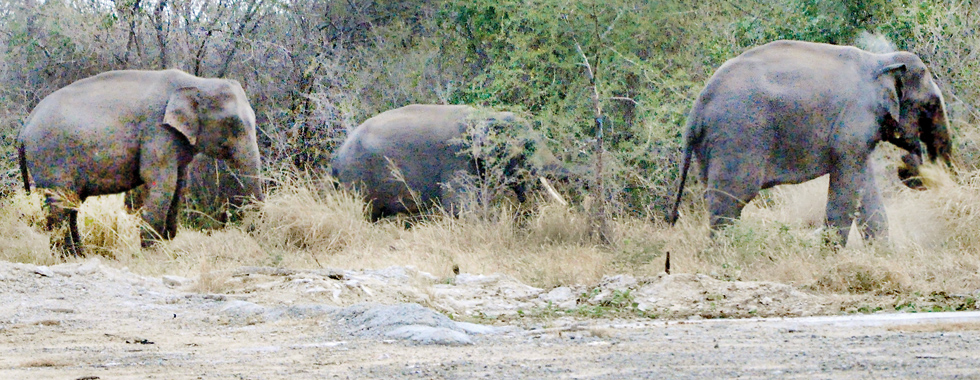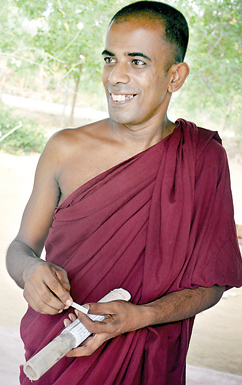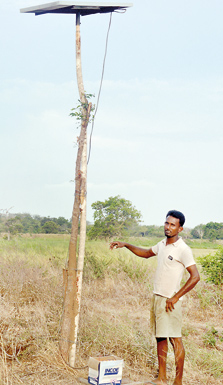News
Round-the-clock vigil of life on the edge
Being charged by an elephant while on the way to school is a distant likelihood for students in many parts of the country, but for 14-year-old W.K. Dhaniska and his schoolmates who live in the village of Muriyakulama in the Karuwalagaswewa area, it is a daily occupational hazard.

And Dhaniska is one child who knows what it is to be charged by an elephant. Recently he was on his way to school around seven in the morning, riding pillion on his father’s bicycle, while his younger brother was seated on the bar in front. As the cycle made its way down the gravel road, an elephant emerged from the thick jungle lining the sides of the road, and charged at them. Dhanishka ran into the jungle with the animal in pursuit, while his father and brother lay on the ground. Hiding behind trees and bushes, Dhanishka managed to evade the elephant and find his way back to the village. His father and brother too made their way home safely.
“I ran in fear when the elephant chased me, but I managed to run and hide from it. The next day I went back to school,” he said. Exchanging ‘elephant tales has become a favourite pastime for children when they meet in school, while the hair-raising experience has not deterred Dhanishka from going to school.
While Dhaniska may be undeterred by his encounter with the animal, for hundreds of villagers in the Puttalam and Kurunegala districts in the North Western Province (NWP) who live dangerously close to elephant habitats, their lives and livelihoods have been disrupted to such an extent that, not many dare venture out of their homes before sunrise or after nightfall.

Ven. Madampelle Sobitha Thera: Armed with Ali wedi
Parents no longer send their children alone to school, for fear of elephant attacks, even if the longest distance they have to ravel is two to three kilometres to the village school, while nighttime religious activities at the village temple have ceased almost completely.
Ven. Madampelle Sobitha Thera, the chief incumbent of the Muriyakulama Vajiraramaya, often hears of the frightening experiences that villagers have had with elephants straying into their properties. “On many days the elephants also come into the temple land. I stop all religious activities before nightfall, so that people can return to their homes safely and stay indoors,” the Thera said. He, like almost all the villagers, is armed with “ali wedi”, or crackers that are specially manufactured to frighten away elephants. They are issued free of charge by the Wildlife Conservation Department office in the area.
But the availability of the crackers is little comfort for those living in this village located on the border of the Tabbowa Sanctuary. Lack of food and water within the sanctuary, with the onset of the drought, is driving the animals to stray onto paddy lands as well as home gardens looking for food. Coconut saplings, watermelon plantations, banana trees, cashew nut plants are an irresistible attraction to the hungry animals. On days that the elephants cannot get their fill from the lands harvested by the villagers, they stray into homes, with tales of an elephant’s trunk finding its way into the pot of rice or salt inside a kitchen of a village home, is in no way an unimaginable episode.
The village of Muriyakulam is home to 262 families (around 844 persons), with no running water or electricity and no proper public transport, and their impoverished lives are taking a worse beating due to the constant threats from the marauding elephants.
A night in the home of a villager can be a nerve-wracking experience, when the stillness of the night sets in. While the villagers turn in early for the night, the sound of the “ali wedi’ can be heard shattering the silence of the night. “It looks like the elephants have made their way near the village tank,” Sobitha Thera tells one of our reporters, as he listens to the direction from which the sound is heard.

Premasiri points to the solar panel that powers the electric fence around the park. Pix by Ranjith Perera
Sunethra Indumathie, along with her three children, is headed to the village tank by late afternoon, to have a bath. She wants to return before it gets dark. “We have to finish all our work before it gets dark and return home, and we cannot start too early as well, because the elephants are roaming around even early in the morning,” she said. Sunethra lives with her family on the border of the Tabbowa Sanctuary and encounters elephants more often than some others.
Those who venture out at night are a few brave but very noisy individuals. As a way to deter the elephants which are known to be sensitive to loud noise, motorcyclists who ride by, continuously toot the horn till they get to their destination, while a three-wheeler driver who could be called upon for an emergency visit to a hospital, or for some other urgent errand, would have the music system in the vehicle at full volume, so as to deter the elephants from coming their way.
R.P.D. Premasiri is one of the villagers who has very little sleep in the nights. In the past two to three months, he has slept away from home in the paddy fields, while the paddy is ripening and is a tempting attraction for the elephants. They have erected an electric fence around the paddy field using a solar panel to power it.
Once when I was in the ‘pela’, I was attacked by an elephant and had a very narrow escape. The elephant came charging from about 70 metres and hit the ‘pela’. I was able to run away and escape. Since birth, I have dealt with elephants, so I knew in what manner to run, in order to escape the elephant. You have to run all over the place in a zigzag manner to outrun an elephant.”
Premasiri, along with a few other villagers, will spend the nights in the ‘pela’ for a few more days till the harvest is reaped. They spend the nights shouting messages from one hut to another, occasionally sipping plain tea or smoking a ‘beedi’ or cigarette, while on the lookout for hungry elephants.
“This has disturbed our family lives as well. My wife and two young children are alone at home, while I stay the night here. I return home in the morning, in time to take my children to school, because I cannot send them alone,” he said.
Premasiri is an active participant at village meetings which are held to find solutions to the human- elephant conflict. He says the close proximity of the border of the Tabbowa Sanctuary to the villages heightens the threat. He confronts both local politicians and parliamentarians elected from the area whenever they come by. “The visits by politicians are more regular now, because there is an election pending. They promise proper electric fencing and other measures to protect us from the elephants, but most often these remain unfulfilled,” he charged.
On Friday, Civil Aviation Minister Priyankara Jayaratna who is also a Puttalam District MP, Wildlife Conservation Minister Wijithamuni Soysa and Wildlife Conservation Dept Director General H.D. Ratnayake were at the Muriyakulama Vajiraramaya to discuss the matter with the villagers.
Mr. Ratnayaka said it was decided that an electric fence would be erected around the village to keep out the elephants.
“What we do may not yield immediate results, but we have to protect the animals as well as the humans, and turn the enmity between them into a friendship,” he said.
In the adjoining village of Bogollagama, Tennakoon Mudiyanselage Bandara who runs a roadside kiosk, has borne the brunt of the elephant attacks. “Of the 125 coconut seedlings I planted a few months ago, over 100 were destroyed by elephants. Then I stepped on a trap set for elephants and injured my leg and damaged my ear. With the little money I got as compensation, I started this kiosk,” he said.
Herath Ekanayaka (44) a farmer from Nelungama has also had over a 100 coconut saplings destroyed by elephants in April this year. He also lost much of the watermelon he had planted on four acres of land he owns. He still awaits the compensation for the damaged property, with the maximum amount he is entitled to being Rs 50,000. Till then, he has to engage in other forms of manual labour to support his wife and young son, and pay off the lease on a mini lorry he purchased. “I have invested a lot of money and energy to plant these trees, but everything has been destroyed. No amount of compensation can make up for the loss,” he says.
Another set of people who have been thrust into the middle of the human- elephant conflict are a group of around 70 families who were given land in the Nelungama area, after their lands were taken over for the Deduru Oya expansion project.
“We were promised one acre of land for living and another acre for paddy harvesting, which is why we were moved here. But now we are in an area where we are facing threats to our lives from elephants,” said Herath Manika (54).She had moved to Nelumgama about eight months ago from Wariyapola, because of the promise of land for farming. “The paddy land we were promised has not yet been given, and we were not aware that we would be living in an elephant infested area,” she said.
As we sit inside her the kiosk she runs, selling a few vegetables grown in her backyard, others who have moved into the area along with her, also gather around. “It’s not the golden land we were promised. We are without the few comforts we had in our old village, such as electricity and clean drinking water, but more than that, we can no longer sleep peacefully in our homes at night, for fear of elephants,” Herath Manika summed up.
(Additional reporting by Karuwalagaswewa Jayaratna)
Polls connect long overdue electric fence for Karuwalagaswewa
Following a meeting between the villagers of Karuwalagaswewa, politicians and government officials, it was decided to erect an electric fence around the village as a temporary measure to ward off elephants.

The meeting held at the Muriyakulama Vajirarama temple was attended by Wildlife Conservation Minister, Vijithamuni Zoysa, Civil Aviation Minister Priyankara Jayaratne and Wildlife Conservation Dept Director General H.D. Ratnayake.
Minister Jayaratne told the villagers that Rs. five million has been allocated to the Wildlife Dept for the proposed electric fence under the ‘Deyata Kirula’ programme, with work on the fence completed within this year.
Responsibility for the maintenance of the fence would be handed over to the Civil Defence Force (CDF) and the villagers.
It was also disclosed that the Divisional Secretariat and the Provincial Council office would also supply ‘ali wedi’, firecrackers used to chase away elephants, to the villagers, apart from the Wildlife Department office which was solely entrusted with the task to date.

